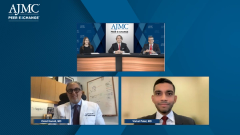
Immunosuppression in CSCC and BCC Treatment
Medical professionals explore CSCC and BCC treatment in high-risk, immunocompromised patients—specifically in the setting of organ transplantation.
Episodes in this series

This is a video synopsis/summary of a Peer Exchange involving Jason Luke, MD, FACP; Christopher Barker, MD; Omid Hamid, MD; Vishal Patel, MD; and Catherine Pisano, MD.
Patel identified immunocompromised patients, who experience high skin cancer burden but were excluded from immunotherapy trials, as having the greatest unmet need. He advised adapting melanoma combination/sequencing strategies to optimize care. While checkpoint inhibitor efficacy is impressive, some patients still progress on therapy. Thus, elucidating proper timing, dosing, and regimens to limit toxicity while maximizing quality responses is needed to expand utility. Luke asked Pisano and Barker about intratumoral and radiation approaches in ineligible immunosuppressed patients. Pisano cited early data on intratumoral immunotherapy combinations that may ultimately expand options beyond systemic therapy. Barker reviewed preclinical data suggesting radiation is less effective in immunocompromised hosts, which may translate into higher failure rates clinically. While dose escalation could help overcome this, advances in delivery like alpha emitters and flash radiation may better enhance local effects without excessive toxicity in these high-risk patients. Luke concluded that despite an absence of data, checkpoint blockade may be utilized as life-extending palliative therapy following appropriate informed consent.
Video synopsis is AI-generated and reviewed by AJMC® editorial staff.
Newsletter
Stay ahead of policy, cost, and value—subscribe to AJMC for expert insights at the intersection of clinical care and health economics.










